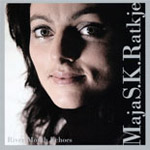|
|
 |
Dusted Reviews
Artist: Maja S. K. Ratkje Album: River Mouth Echoes Label: Tzadik Review date: Jun. 17, 2008 |

|
|
|
 |
How does one write about contemporary classical music? Leaving aside the terminological difficulties in merely naming the genre (“new music,” “art music,” “contemporary classical,” and the like all fail for various reasons) and the conventions of musicology and musical analysis, what can be said about classical music in a post-classical world, especially when faced with a series of compositions such as these that refer to the classical while also ripping it apart at the seams? And how do I talk about it in such a way so as to not reduce it to the stereotypes of the genre: discussions of formal elements and structure, the way the composer takes a melody and develops it, the relative ease and aplomb of the performers, the skill by which the music is executed, and so forth, thereby reducing the music to a cadaver being dissected by a medical student or a corpse being examined by the coroner?
The problem is that some of Maja Solveig Kjelstrup Ratkje’s compositions compiled on this CD are worthy of such a discussion, bathed in the language of the composers’ roundtable or the musicologist’s forum. So excuse me for a second while I try to discuss them as such, while trying to avoid some of the pitfalls of the style. Despite being known primarily as one of the chief instigators of the improv group Spunk and the noisemongers fe-mail, her vocal and improvisational prowess (documented in 2002’s Voice), and her collaborations with Jaap Blonk, Jazzkammer, Lasse Marhaug, and others, she is also a composer of chamber music, loosely defined. This entire CD could be considered a single coherent work, with one piece freely flowing into the next, the processed saxophone of “ØX” morphing into the accordion of “Essential Extensions,” the vocals and vocalizations of “Wintergarden” transforming into the violas da gamba of “River Mouth Echoes.” All the pieces are thus interrelated, while all managing to have lives of their own.
“River Mouth Echoes” stands out as the central work of the record, its violas da gamba referencing Bartók and Ligeti, Boulez and Kurtág, stretching the instruments to their fullest. The viola da gamba, being a progenitor of the contemporary violin and cello, sounds inherently antique, suited more for music of the 16th century than the 21st, but Ratkje manages to imbue them with an intense sense of the contemporary. It almost sounds as if a composition by Purcell were torn apart, laced with sounds from the noise scene, and then reformulated for acoustic instruments. That is the key element of her aesthetic, in fe-mail or Spunk or on her own––taking the old, radically reconsidering it, and making it something new. Even something as far removed from classical syntax as “ØX,” which takes an alto sax and processes it within an inch of its life, surrounding it first by walls of static and pinging sine waves before degrading into surprising emotive set of harmonies, makes its recourse to the old, through its rhetorical pacing and development. Or “Wintergarden,” an excerpt from her soundtrack to a film by Daria Martin, which mixes Meredith Monk or Joan La Barbara with what could be outtakes from Björk’s Medulla, again with a harmonic core that Ratkje freely ignores and returns to. It’s as if her language consisted of the process of remembering what it means to be noise and what it means to be melody and outlining the space in between.
Taking a step back from the somewhat academic view of this CD, it is clear that Ratkje operates within a new creative space, one that sees composed “classical” music as just another possible form of expression, as part of a continuum that starts with the improvised and ends with the highly composed orchestral works of the late-19th and 20th centuries. This is no post-modern pastiche, though; there is no ironic wink, nothing to say “I don’t really mean this.” The fun in these comes not from there references to the past, but in the way that they think beyond the normal strictures of the so-called classical establishment. Even in writing for the Oslo Sinfonietta in “Waves IIB,” she manages to take the orchestra beyond mere crunchy chords into a kind of logic with Burning Star Core and such as its base. These may be minute distinctions, but they show one way that classical music, or whatever you want to call it, can move out of its current dead end by listening beyond the hallowed halls of the canon. Perhaps the folks that write about classical music will be able to follow suit.
By Dan Ruccia
|







